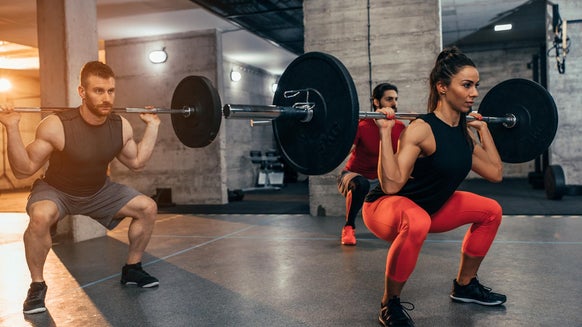Protein Fact vs. Fiction | Nutritionist Debunks The Biggest Protein Myths

Have you ever wondered why there are specific protein recommendations, questioned when the best time to take protein actually is, or worried over whether it’s possible to take too much protein?
Good news if you have. Specialist dietitian Elle Kelly has answers to all these long-asked questions. From unravelling the mysteries of protein consumption to understanding muscle-building nuances, she separated protein fact from fiction.
1. “More protein = more gains”
Elle kicks things off by setting the record straight: "Consuming more protein than you need doesn't offer an advantage in terms of health or physical performance. Excess protein will be used for energy, just like the case with consuming more of any other nutrient."
According to the International Society of Sports Nutrition, most active individuals find the sweet spot at 1.4-2g of protein per kg of body weight daily. In one study, muscle mass suffered on a low-protein diet, but increasing from 1.4g to 2.3g didn't summon any muscle-building magic. So, it’s about getting enough rather than eating too much.
2. “Only protein is required for building muscle”
Elle offers a more holistic perspective: "Focusing on protein without looking at other aspects such as energy and carbohydrate intake may have a limiting effect on muscle-building,"
All macronutrients are essential for a healthy, balanced diet. Yes, you need protein to boost muscle growth, but you also need carbs and fats.
3. “Protein shakes are necessary for muscle gain”
"The amount of protein you need depends on a variety of factors," Elle explains. Protein powders can be a useful tool for those with specific dietary needs or high-protein requirements due to activity levels.
"For those who have restrictive diets or lead busy lifestyles or travel a lot, protein shakes are a super convenient way to increase protein in your diet and to help you meet your overall energy needs," she adds.
Elle recommends adding a scoop of protein to your meals and smoothies to help bump up the protein content to meet your daily protein needs: "Most protein shakes provide 20 to 30g of protein per scoop, which is the recommended amount we should have spread throughout the day."
4. “Your body can only absorb a certain amount of protein in one go”
While this is not directly true, Elle says there is "evidence that spreading out your intake across the day, rather than having a large amount of protein in one or two settings, is better for muscle growth."
5. “Too much protein is harmful”
Elle says there's no evidence supporting harm in healthy individuals.
However, those with impaired liver or kidney function might benefit from a low-protein diet, a decision best discussed with a healthcare professional.
6. “It's difficult to get enough protein on a vegetarian or vegan diet”
Proteins from animal-based sources like meat, fish, eggs, and dairy are generally complete sources of protein, containing all nine essential amino acids. Plant-based sources, like beans and lentils, often lack or have lower levels of some amino acids.
However, exceptions include soy-based products such as protein isolates, soy milk, yoghurts, tofu, and tempeh, which provide all nine essential amino acids. It's important to note that you don't necessarily need to rely on these specific foods for complete protein intake.
According to Elle, you can compensate for missing amino acids in plant-based diets by combining different protein sources at a meal. This concept, known as complementary proteins, is illustrated by simple meals like beans on toast.
"Beans are high in lysine but low in methionine, whereas bread is low in lysine and higher in theanine, making beans on toast a meal that can provide all essential amino acids," she explains.
For those following a vegetarian or vegan diet, protein supplements can also be beneficial. "They offer a more complex protein source, and depending on the type and brand, they usually provide a broad spectrum of, if not all, the essential amino acids".
Take Home Message
Hopefully Elle’s cleared up any confusion when it comes to protein and guided you on your way towards better-informed nutrition.
As with all things diet, it’s more about understanding why we need certain macronutrients, and figuring out what quantities are needed to match specific goals, rather than blindly following some trend or something you read on social media.








